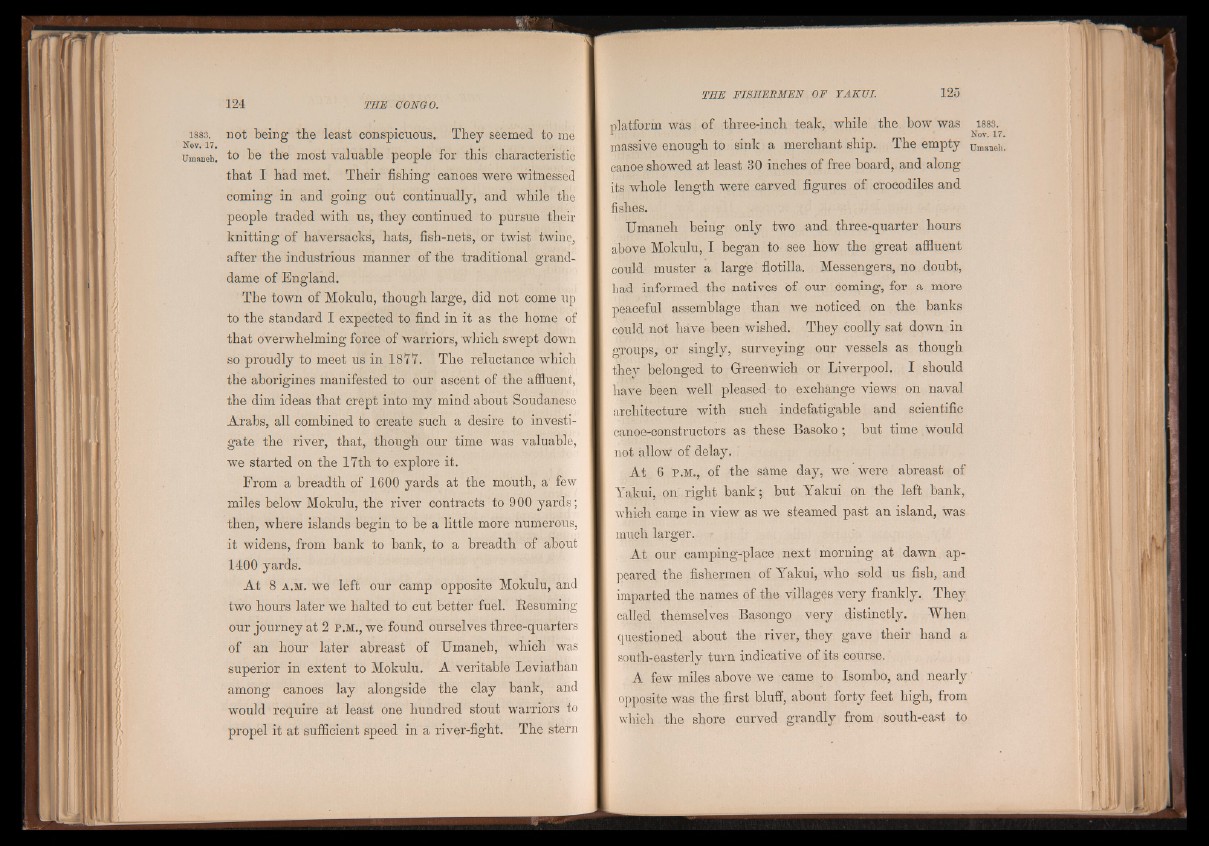
1883. not being the least conspicuous. They seemed to me
Umaneh. to he the most valuable people for this characteristic
that I had met. Their fishing canoes were witnessed
coming in and going out continually, and while the
people traded with us, they continued to pursue their
knitting of haversacks, hats, fish-nets, or twist twine,
after the industrious manner of the traditional grand-
dame of England.
The town of Mokulu, though large, did not come up
to the standard I expected to find in it as the home of
that overwhelming force of warriors, which swept down
so proudly to meet us in 1877. The reluctance which
the aborigines manifested to our ascent of the affluent,
the dim ideas that crept into my mind about Soudanese
Arabs, all combined to create such a desire to investigate
the river, that, though our time was valuable,
we started on the 17th to explore it.
From a breadth of 1600 yards at the mouth, a few
miles below Mokulu, the river contracts to 900 yards;
then, where islands begin to be a little more numerous,
it widens, from bank to bank, to a breadth of about
1400 yards.
At 8 a .m . we left our camp opposite Mokulu, and
two hours later we halted to cut better fuel. Resuming
our journey at 2 P.M., we found ourselves three-quarters
of an hour later abreast of Umaneh, which was
superior in extent to Mokulu. A veritable Leviathan
among canoes lay alongside the clay bank, and
would require at least one hundred stout warriors to
propel it at sufficient speed in a river-fight. The stern
platform was of three-inch teak, while the. bow was
massive enough to sink a merchant ship. The empty
canoe showed at least 30 inches of free board, and along
its whole length were carved figures of crocodiles and
fishes.
Umaneh being only two and three-quarter hours
above Mokulu, I began to see how the great affluent
could muster a large flotilla. Messengers, no doubt,
had informed the natives of our coming, for a more
peaceful assemblage than we noticed on the banks
could not have been wished. They coolly sat down in
groups, or singly, surveying our vessels as though
they belonged to Greenwich or Liverpool. I should
have been well pleased to exchange views on naval
architecture with such indefatigable and scientific
canoe-constructors as these Basoko; but time would
not allow of delay. '
At 6 p .m ., of the same day, we were abreast of
Yakui, on right bank'; but Yakui on the left bank,
which came in view as we steamed past an island, was
much larger.
At our camping-place next morning at dawn appeared
the fishermen of Yakui, who sold us fish, and
imparted the names of the villages very frankly. They
called themselves Basongo very distinctly. When
questioned about the river, they gave their hand a
south-easterly turn indicative of its course.
A few miles above we came to Isombo, and nearly
opposite was the first bluff, about forty feet high, from
which the shore curved grandly from south-east to